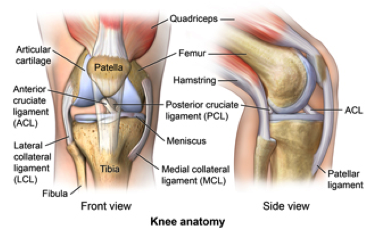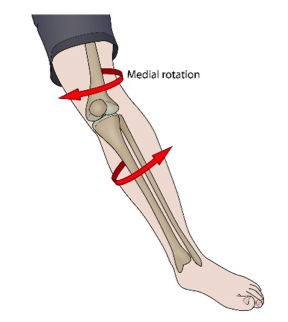ACL and MCL injuries can be significant injuries, resulting in length periods of rehab, time off sport and work.
The MCL, or medial collateral ligament supports the inside of the knee. ACL, or Anterior Cruciate Ligament is located in the middle of the knee joint. This ligament is crucial for providing stability to the knee, specifically with twisting and pivoting motions. These ligaments are often injured together in varying severities.

How are they injured?
Contact injuries: Both the ACL and MCL can be injured resulting from a blow to the outside of the knee. This forces the knee inwards towards the midline of the body, overstretching the ligaments.
Non-contact: Rapid change of direction or pivoting can injury the ACL and MCL. This is type of injury is more common.

ACL
Grades of injury and signs & symptoms
Although there is evidence of partial tearing, ACL injuries are usually full ruptures due to the forces experienced during change of direction, or an impact to the side of the knee.
Signs & Symptoms include:
- Feeling your knee gives way, often with an audible clunk at time of injury
- Quick and significant swelling
- Pain is often not to significant.
- Can experience difficult weight bearing.
The first step is confirming an ACL injury. You will be referred for a scan to confirm, and rule out other injuries including meniscal tears.
Initial Management
- Reduce activity
- If needed for pain, apply ice for 20mins 3-4 times day for the first 2 days
- Continue gentle bending and straightening of the knee as tolerated
- Weight bear as tolerated, small walks only, no running
- Try to avoid anti-inflammatory medication in this phase
- A brace for a short amount of time if your knee feels unstable
Decision Making
If an ACL injury is confirmed, evidence suggests waiting initially 6 weeks, or until the knee is pain-free with no swelling before continuing with surgery. During this phase we aim to:
- Eliminate pain and swelling
- Restore full range of motion
- Restore normal walking
- Regain equal quadriceps and hamstring strength between sides
- Regain hopping ability if possible
Operative vs Nonoperative Treatment
There is increasing evidence suggesting some individuals can ‘cope’ without an ACL. Depending on your goals, which the activities you wish to return to, your life schedule and surgeon’s guidance we can discuss these options. A minimum of three to six months of conservative management is required to evaluate how you can cope.
MCL
Grades of injury and signs & symptoms
Grade I: An ‘overstretch’ of the ligament, but obvious tearing of the ligament. You will notice pain, likely swelling around the inside of the knee. Full movement will still be possible but may be uncomfortable initially.
Prognosis & Treatment
Enough healing to allow return to activity is usually 2-3 weeks. This will vary depending on the activity you would like to return to. The ligament won’t reach full strength however until 6 weeks. Treatment for this grade is simple:
0-72 hours
- If needed for pain, apply Ice for 20mins 3-4 times day
- Reduce activity
- Continue gentle bending and straightening of the knee as tolerated.
- Weight bear as tolerated, small walks only, no running.
- Try to avoid anti-inflammatory medication in this phase.
- Braces are rarely required
3 days – 1 week:
- Achieve normal walking pattern pain free
- Comfortable range of motion
- Commence strengthening exercises
1 week to 6 weeks:
- Progress strengthening to ensure equal between sides
- Commence running when pain free and able
- Return to training at 2-3 weeks
- Once completed full training, return to play
Grade II: Tearing is evident anywhere from a few fibres to the majority of the ligament. Pain and swelling will be more notable and bruising likely present as well. These will correspond to the amount of damage to the ligament.
Prognosis and Treatment
Rehabilitation can take 6-10 weeks. This is dependent on the size of the tear and the sport you are returning to. Initial acute injury management detailed above is used for the first few days. A light knee support is useful for pain relief, as with crutches if you are limping. Rehab aims to:
- Reduce pain and restore motion using hands on manual therapy, soft tissue massage and home exercises
- Regain strength in your affected leg
- Safely return to training and full match play. For high pivoting sports this is a minimum for 6 weeks from original injury.
Grade III: A complete rupture of the ligament. Pain will be significant, swelling will be almost immediate. Your may hear a tearing noise. Bruising will result as well. Moving your knee and possibly weightbearing may be very painful. Your knee may feel unstable.
Prognosis and Treatment for ACL & MCL injuries
These are significant injuries that can cause instability of the knee. They can also occur in conjunction with ACL and medial meniscal injuries. Bracing is used initially for 2 weeks to allow appropriate healing of the ligament. Important to achieve to full extension and flexion to 90 degrees. Crutches may also be needed if you are walking with a limp. These are weaned off as walking pattern is pain free with no limp and enough ligament healing is evident. This is usually about 6 weeks. Gradual restoration of range of motion, strength and function progress over the next 3-4 months. With these injuries it is important to be guided by an orthopaedic consultant to manage any concurrent injuries, and as tears in different parts of the ligament respond to treatment differently.
Physiotherapy Treatment aims include:
- Reduce acute pain, prevent stiffness in the knee while wearing a brace using hands on manual therapy and soft tissue massage
- Prescribe initial activation exercises to quads, hamstrings, gluteals to prevent muscle wasting.
- Guide you through use of and time frames for your brace and crutches, with gradual weaning off these.
- Progress your strengthening and facilitate return to play in conjunction with your specialist and coaching staff.
Visit our Physiotherapy page for more information about this service and how we can help.
For more detailed information regarding ACL injuries, read our blog about post-operative ACL rehabilitation.
Image:
1. https://www.hopkinsmedicine.org/health/conditions-and-diseases/ligament-injuries-to-the-knee
2. https://www.sportsinjurybulletin.com/acl-rehabilitation-when-is-your-athlete-really-ready-for-sport/


